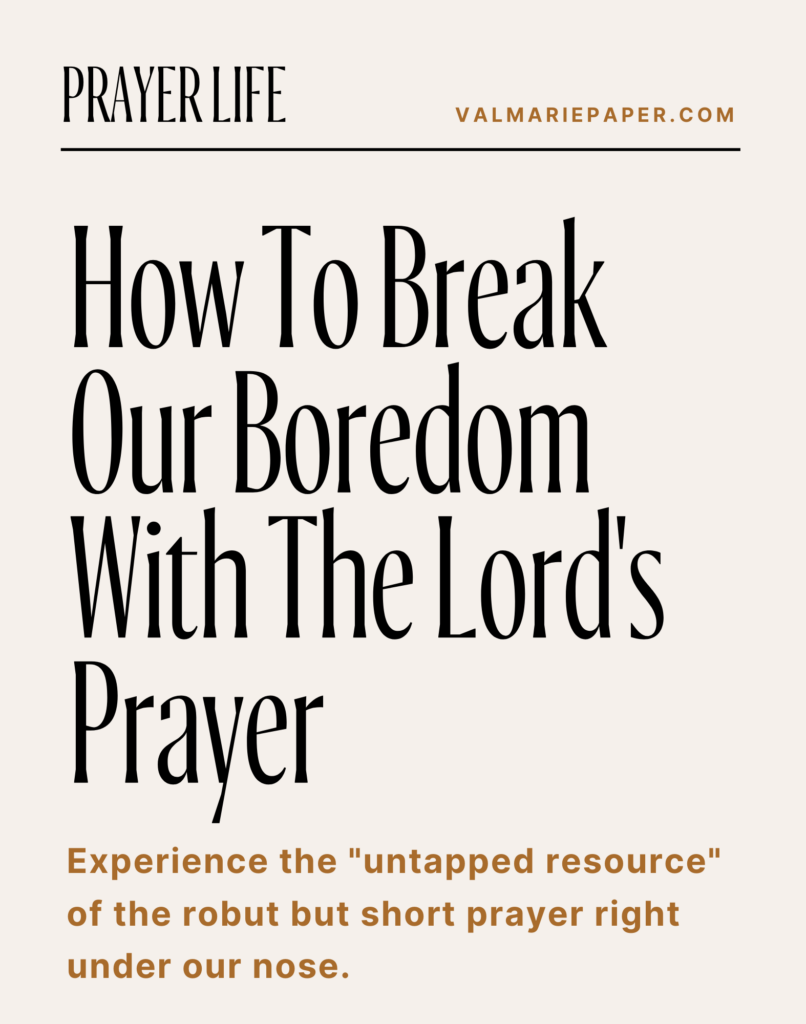 If you’ve been a Christian for a while, you’ve likely heard the Lord’s Prayer many times. You might have even groaned when you saw this blog post. Ugh, Val, give me something fresh! Can I just say, as someone who’s been in church since I was 18 months old, I hear you!
If you’ve been a Christian for a while, you’ve likely heard the Lord’s Prayer many times. You might have even groaned when you saw this blog post. Ugh, Val, give me something fresh! Can I just say, as someone who’s been in church since I was 18 months old, I hear you!
It’s easy for this set of words that feel so antiquated and basic to hang out in the background of our prayer lives. Like, it’s around but doesn’t hold a prominent place. It’s sitting next to our VBS t-shirts and first children’s Bible and possibly that framed picture of a lamb and Psalm 23 all typed out in a flourishy font.
Tim Keller said, “The Lord’s Prayer may be the single set of words spoken more often than any other in the history of the world…Yet it is an untapped resource, partially because it is so very familiar.”
Isn’t that crazy to think?
In the last few years, though, I remember reading a book and the author was experimenting with praying the Lord’s Prayer daily and it got me thinking: I’ve never really given The Lord’s Prayer a fair shake. That might sound strange, but even though I could tell you what each line means (at least on a basic level) I hadn’t really let it change my prayers or my life. Really? I could just answer the right questions if I was quizzed on the topic.
I hope to convince you today that The Lord’s Prayer might be the thing to add some vibrancy to your prayer life instead of dulling it.
Why?
1. We can answer our own questions.
So many of us feel unsure of what to say in prayer. We’re constantly asking what’s ok and what’s not. What’s important and what’s not? Does God care? Will He answer this one? How should I approach Him? And lo and behold, here we have the very words of Christ guiding us! This can get lost on us a lot, but sit with this thought: The one we pray to and wish we could verbally hear from about how to pray laid it all out in black and white for us. Praying prayers full of confidence instead of just throwing spaghetti at a wall to see what sticks brings enormous power. We’re not adding a question mark to every line. We’ve got a conviction that helps us know God hears us.
2. Memorized prayers can be real.
Elisabeth Elliot said, “I grew up thinking only my spontaneous prayers mattered.” Have you felt that way too? It’s really easy to overreach and assume that any repetition in prayer is a bad thing because the Bible literally says (in the NKJV) not to use vain repetition like the heathens! Yikes! (Matthew 6:7) That’s reason enough to stay far away right? I don’t think so. I think the benefits of praying (and meaning!) the Lord’s prayer are so valuable. It allows us to cover the gamut with the Lord in prayer and hit on so many things that we maybe wouldn’t naturally include in our prayers. In my book, Pray Confidently and Consistently, I mentioned how praying prayers like Jesus in the Garden of Gethsemane when he prayed, “Father if you are willing, remove this cup from me. Nevertheless, not my will, but yours, be done”––would have never naturally been a prayer of mine. I was only able to pray it as I saw Jesus pray it. Memorized prayer can expand our prayers beyond our own words and that can be a really powerful thing.
Related post: Tired of repeating the same prayers?
3. Short and simple can change our life.
In less than a minute, we have the opportunity to praise God, surrender our hearts, lift up our needs, pray for forgiveness, be reminded of eternity, and pray for protection. Everyone’s talking about how small but consistent habits can change our lives. Can you imagine if we prayed the Lord’s Prayer daily or even multiple times a day when we’re making our coffee, sitting at a red light, standing at the checkout, crossing a parking lot, or making our bed? In a class I taught called, Where Prayer Meets Science, I talk about the grooves in our brain and how intentional repetition is actually a good thing and can rewire our faulty thinking. Imagine multiple moments of the day when we get to remember the eternal kingdom and that we care more about God’s will than our own. This could totally shake me out of my self-focused moments of panic or overwhelm over small worldly things.
Now let’s break down the Lord’s Prayer and hopefully add a bit of understanding beyond what we may already be familiar with. I’ve been researching and reading and found a few resources, in particular, helpful so you’ll see those at the end of the post and the source’s quotes throughout.
Matthew 6:9-13
OUR FATHER IN HEAVEN
- It’s interesting to note the juxtaposition of Father and heaven. One emphasizes our personal relationship to God but reminds us what a privilege this is that we can call the creator of the universe, Father.
- All people are creations of God, not all are children of God. Elmer L. Towns shares an analogy of a kid asking him for cotton candy at the fair. Because it wasn’t his child, he couldn’t just give them kid cotton candy. He likened this to us with God. Our being able to go to God and have God respond is only possible for His children, those who follow Him.
- We have immediate access to God every moment of the day.
- How do we see God? Is it accurate?
- Read chapter 1 in Pray Confidently and Consistently if you need a pep talk!
HALLOWED BE THY NAME
- Not a request that God becomes holy, but rather that he may be respected and treated as holy. -Larry Richards
- We are praying that God keeps us from dishonoring the name by which we are called and that he would empower us to become ourselves good and holy. -Tim Keller
- Towns emphasized hallowing the many facets of God.
- Hallowed be Your name, Creator God, I meditated on, for You created the Black Hills.
- Hallowed be Your name, Lord. I thought about His kindness to people.
- Hallowed be Your name, Master. I submitted to his rulership as the Master of my life.
- Hallowed be Your name, Almighty. I recognized His power in the flashing lightning and in the thunder rolling up the valleys.
- Hallowed be Your name, Father. I praised Him for loving me and taking care of me.
- When you pray therefore, remember that God’s glory is greater than your problems…greater than your needs…greater than your fears…greater than anything you want to do for Him. -Towns
- How can we honor God and hallow His name?
- Can we do this for longer than we think?
YOUR KINGDOM COME
- Looks ahead to the kingdom coming in the future as well as to the present but opens our eyes to the eternal and not just what we can see.
- From Towns:
- You are praying for the Kingdom to be expanded into the lives of people who will become rightly related to the King. As you think of unsaved friends and relatives, you are praying for their salvation every time you ask, “Thy kingdom come.”
- You are asking for the return of Jesus to establish His kingdom on this earth.
- We are asking God to so fully rule us that we want to obey him with all our hearts and with joy. -Keller
- To pray your kingdom come is to “yearn for that future life”. -Martin Luther
- I love how Elisabeth Elliot puts it: Do whatever is needed to bring your kingdom here.
- Do we truly want God’s kingdom to come?
- If it scares us, can we pray to Him about that honestly?
YOUR WILL BE DONE
- When we pray “your will be done”, we are acknowledging that God’s ways are higher than our ways. We are surrendering our plan to God and making clear, God, I know your plan is best and I am not only asking for you to fulfill it but actively choosing to obey it.
- …both a personal commitment to moral obedience and a commitment to participate in the fulfillment of God’s purposes here on earth. -Richards
- Grant us grace to bear willingly all sorts of sickness, poverty, disgrace, suffering, and adversity and to recognize that in this your divine will is crucifying our will. -Luther
- When you pray, “thy will be done,” you are not passively surrendering to God’s will just because you can’t do anything about it. You actively submit to His plan with joyful anticipation about doing it. -Towns
- Do we trust God’s plan?
- Are we ready to obey?
- Check out this blog post on surrender or this chapter 7 of Pray Confidently and Consistently if you need encouragement.
ON EARTH AS IT IS IN HEAVEN
- How is God’s will done in heaven? Fully, joyfully and spontaneously. -Richards
- Towns refers to this as the semi-conclusion wrapping up the first section of the Lord’s Prayer. It’s between the previous three statements all having to do with God’s sovereignty and the following four that have to do with our neediness.
GIVE US THIS DAY OUR DAILY BREAD
- The ultimate reminder that we are finite beings. We have needs. This is not a flaw but how God designed us. We cannot do this life on our own. Those moments when we feel overwhelmed by a lack of, it’s hard to imagine that God created us to be finite but it brings peace to my heart to know that I will always need from God and I am not waiting to get to a place on earth of self-sufficiency.
- In America, in many ways, we can feel self-sufficient but the reality is, we need God’s provision in our life and this is our ongoing reminder that we are fully dependent on Him. You’ve likely heard me say, the most important ingredient we need to pray more regularly is an awareness of just how dependent we are on God. May these six words remind us of our finiteness.
- Much like manna, God supplies just what we need for today. Again, I think this makes us so uncomfortable. We want to stockpile and plan ahead so we can go it alone for a while, but God is continually calling us to walk with Him daily and reach out to Him always.
- What are we in need of?
- What requests do we need to share with God? Nothing is too big or small.
AND FORGIVE US OUR DEBTS,
AS WE ALSO HAVE FORGIVEN OUR DEBTORS
- Too many of our prayers lack confession. And it’s a shame because confession is not only a necessary part of our prayer life but also healing. Unconfessed sin rots the bones (Psalm 32:2). It destroys our intimacy with God.
- If we find confession and repentance intolerably traumatic or demeaning, it means “the heart is not right with God and cannot draw…confidence from his Gospel.” If regular confession does not produce increased confidence and joy in your life, then you do not understand the salvation by grace, the essence of the faith….So unresolved bitterness is a sign that we are not right with God. It also means that if we are holding a grudge, we should see the hypocrisy of seeking forgiveness from God for sins of our own. -Keller quoting Luther
- What do we need to confess?
- And who do we need to forgive?
AND LEAD US NOT INTO TEMPTATION
- This part and the next both involve protection but this one refers to protection from our flesh.
- Jesus may have been teaching us to pray that we be spared from failing the test rather than spared the test of temptation itself. -Richards
- “The prayer is not that we should not be tempted, but that we should not be brought [or led] into temptation.” Temptation in the sense of being tried and tested is not only inevitable but desirable. The Bible talks of suffering and difficulty as a furnace in which many impurities of soul are “burned off” and we come to greater self-knowledge, humility, durability, faith and love. However, to “enter into temptations,” as Jesus termed it, is to entertain and consider the prospect of giving in to sin. -Keller quoting Augustine
- Do we recognize that we can flee temptations or think it’s inevitable to fall into them? Do this give you hope that you can pray for God’s protection in these moments?
- Need help? Check out this blog post on temptation.
BUT DELIVER US FROM EVIL
- This portion similar to the last point is referring to temptations outside of us.
- This is a reminder that our battle is not against flesh and blood but against spiritual forces. (Ephesians 6:12)
- Are there people or circumstances I’m assuming are my enemy when they really aren’t?
- When we come to this part of our prayer, can we ask God to help us better recognize the real battle?
- For more help, reflect on chapter 11 of Pray Confidently and Consistently about our spiritual battles.
A few additional thoughts on the Lord’s Prayer as a whole that I found interesting:
- Our prayers are to enhance God’s glory.
- Jesus not only modeled calling God Father but made it possible for us to do the same. “Jesus puts ‘Abba’ on the lips of those who trust in him, for he bought their birthright with his blood. Jesus, therefore, does not simply offer to use the example of sonship in prayer. He does far more than model loving and intimate trust in the heavenly Father. Rather, he does what only he could do in the perfection of his divine and human sonship.” -D.A. Carson
- The prayer uses plural forms emphasizing prayer in community. “C.S. Lewis argues that it takes a community of people to get to know an individual. Reflecting on his own friendships, he observed that some aspects of one of his friend’s personalities were drought out only through interaction with a second friend. That meant if he lost the second friend, he lost the part of his first friend that was otherwise invisible. It’s worth noting, Towns says that the plural pronoun means you are coming with Jesus to the Father. “Although it is appropriate to pray the Lord’s Prayer along with others in a public worship service, God does not hear your prayers just because you come with others. … God hears your prayers because you come with Jesus Christ.”
 TAKE ACTION!!
TAKE ACTION!!
Put it in your own words. After reading through this post and exploring what each part of the prayer means, don’t feel like you must recite this exact prayer to have meaning. Jesus does say to pray “like” this. He’s showing you the heart. I think memorizing and repeating this prayer can be powerful but know that we are not limited to that.
Use this helpful chart from some content Elmer L. Towns shared in his book, Praying the Lord’s Prayer for Spiritual Breakthrough, to help think through each part in fresh ways.
RESOURCES
Praying the Lord’s Prayer for Spiritual Breakthrough by Elmer L. Towns
Prayer by Timothy Keller
Every Prayer and Petition in the Bible by Larry Richards
The Lord’s Prayer Part 1 on The Elisabeth Elliot Podcast
Teach Us To Pray by D.A. Carson











Leave a Reply
Comments (0)